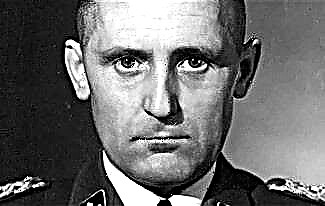Socrates - an ancient Greek philosopher who made a revolution in philosophy. With his unique method of analyzing concepts (maieutics, dialectics), he drew the attention of philosophers not only to the comprehension of the human personality, but also to the development of theoretical knowledge as the leading form of thinking.
The biography of Socrates is full of many interesting facts. We described the most fascinating of them in a separate article.
So, before you is a short biography of Socrates.

Socrates biography
The exact date of birth of Socrates is unknown. It is believed that he was born in 469 BC. in Athens. He grew up and was brought up in the family of a sculptor named Sofronisk.
Socrates' mother, Phanareta, was a midwife. The philosopher also had an older brother, Patroclus, to whom the head of the family bequeathed the bulk of his inheritance.
Childhood and youth
Socrates was born on 6 Fargelion, on an "unclean" day, which played a fundamental role in his biography. According to the laws of the time, he became a lifelong priest of the health of the Athenian government without content.
Moreover, in the archaic period of time, Socrates could be sacrificed by mutual consent of the popular assembly. The ancient Greeks believed that in this way the sacrifice helped to solve problems in society.
Growing up, Socrates received knowledge from Damon, Conon, Zeno, Anaxagoras and Archelaus. An interesting fact is that during his lifetime the thinker did not write a single book.
In fact, the biography of Socrates is the memories of his students and followers, among whom was the famous Aristotle.
In addition to his passion for science and philosophy, Socrates took an active part in defending his homeland. He participated in military campaigns 3 times, showing enviable courage on the battlefield. There is a known case when he saved the life of his commander Alcibiades.
The philosophy of Socrates
Socrates expounded all his thoughts orally, preferring not to write them down. In his opinion, such recordings destroyed memory and contributed to the loss of the meaning of this or that truth.

His philosophy was based on the concepts of ethics and various manifestations of virtue, including knowledge, courage and honesty.
Socrates argued that knowledge is a virtue. If a person is unable to realize the essence of certain concepts, then he will not be able to become virtuous, to show courage, honesty, love, etc.
The disciples of Socrates, Plato and Xenophon, described the views of the thinker on the attitude towards evil in different ways. The first stated that Socrates had a negative attitude towards evil even when it was directed against the enemy. The second said that Socrates allowed evil if it happened for the purpose of protection.
Such contradictory interpretations of statements are explained by the manner of teaching that was inherent in Socrates. As a rule, he communicated with students through dialogues, since it was with this form of communication that truth was born.
For this reason, the soldier Socrates talked with the commander Xenophon about the war and discussed evil using examples of fighting the enemy. Plato, however, was a peaceful Athenian, so the philosopher built completely different dialogues with him, resorting to other examples.

It is worth noting that in addition to dialogues, the philosophy of Socrates had a number of significant differences, including:
- dialectical, colloquial form of the search for truth;
- definition of concepts in an inductive way, from the particular to the general;
- search for truth with the help of maieutics - the art of extracting knowledge hidden in each person through leading questions.
When Socrates set out to find the truth, he asked his opponent a series of questions, after which the interlocutor got lost and came to unexpected conclusions. Also, the thinker liked to build a dialogue from the opposite, as a result of which his opponent began to contradict his own "truths".
Socrates was considered one of the wisest people, while he himself did not think so. The famous Greek saying has survived to this day:
"I only know that I know nothing, but others do not know this either."
Socrates did not seek to portray a person as a fool or to put him in a difficult position. He just wanted to find the truth with his interlocutor. Thus, he and his listeners could define such deep concepts as justice, honesty, cunning, evil, good and many others.
Aristotle, who was a student of Plato, decided to describe the Socratic method. He stated that the basic Socratic paradox is this:
"Human virtue is a state of mind."
Socrates enjoyed great authority with his compatriots, as a result of which they often came to him for knowledge. At the same time, he did not teach his followers eloquence or any crafts.
The philosopher encouraged his students to show virtue to people, and especially to their loved ones.

It is curious that Socrates did not take payment for his teachings, which caused discontent among many Athenians. This was due to the fact that at that time the children were taught by their parents. However, when young people heard about the wisdom of their compatriot, they rushed to get knowledge from him.
The older generation became indignant, as a result of which the fatal accusation for Socrates of "corrupting youth" arose.
Mature people argued that the thinker turns young people against their parents, and also imposes harmful ideas on them.
Another point that led Socrates to death was the accusation of impiety and the worship of other gods. He stated that it is unfair to judge a person by his actions, since evil occurs due to ignorance.
At the same time, there is a place for good in the soul of every person, and a demon-patron is inherent in every soul.
The voice of this demon, which today many would describe as a "guardian angel", from time to time whispered to Socrates how he should behave in difficult situations.
The demon "helped" Socrates in especially difficult situations, so he could not disobey him. The Athenians took this patron demon for a new deity, whom the philosopher allegedly worshiped.
Personal life
Until the age of 37, no high-profile events took place in the biography of Socrates. When Alcibiades came to power, whom the thinker saved during a battle with the Spartans, the inhabitants of Athens had another reason to accuse him.
Before the arrival of the commander Alcibiades, democracy flourished in Athens, after which a dictatorship was established. Naturally, many Greeks were unhappy with the fact that Socrates once saved the commander's life.
It is worth noting that the philosopher himself has always sought to defend unjustly condemned people. To the best of his ability, he also opposed representatives of the current government.

Already in old age, Socrates married Xanthippe, from whom he had several sons. It is generally accepted that the wife was indifferent to the wisdom of her husband, differing in her bad character.
On the one hand, Xantippus can be understood that all Socrates almost did not participate in the life of the family, did not work and tried to lead an ascetic lifestyle.
He walked the streets in rags and discussed different truths with his interlocutors. The wife repeatedly insulted her husband in public and even used her fists.

Socrates was advised to drive away the obstinate woman who disgraced him in public places, but he just smiled and said: "I wanted to learn the art of getting along with people and married Xanthippe in the confidence that if I can bear her temper, I can withstand any characters."
Death of Socrates
We also know about the death of the great philosopher thanks to the works of Plato and Xenophon. The Athenians accused their compatriot of not recognizing the gods and corrupting the youth.
Socrates refused a defender, saying that he would defend himself. He denied all accusations against him. In addition, he refused to offer a fine as an alternative to punishment, although according to the law he had every right to do so.
Socrates also forbade his friends to make a deposit for him. He explained this by the fact that paying the fine would mean an admission of guilt.
Shortly before his death, friends offered Socrates to arrange an escape, but he flatly refused this. He said that death will find him everywhere, so there is no point in running away from it.
Below you can see the famous painting "Death of Socrates":

The Thinker preferred execution by taking poison. Socrates died in 399 at the age of about 70. This is how one of the greatest philosophers in the history of mankind died.
Socrates Photos















